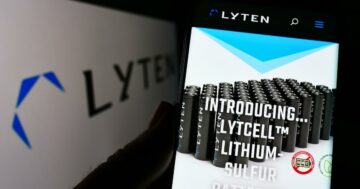
A group of over 20 corporations have backed a new initiative to deliver the first shipment of clean hydrogen across the Atlantic by 2026.
The Mission Possible Partnership (MPP) — which brings together leading industrial firms and green business groups committed to decarbonizing heavy industries — announced Oct. 12 that it has teamed up RMI, Systemiq, Power2X and others to form the Transatlantic Clean Hydrogen Trade Coalition (H2TC).
The new group said it would aim to support first movers in the emerging hydrogen economy in the US Gulf Coast and Northwestern Europe, with the goal of facilitating the transatlantic trade of more than three million metric tons per year of clean hydrogen in the form of green ammonia and methanol by 2030.
Coalition partners include the Center for Houston’s Future, the Port of Corpus Christi and the Port of Rotterdam. The initiative, which will see MPP serve as its secretariat, has also been endorsed by over 20 companies operating in the emerging hydrogen economy, including Ambient Fuels, Apex Clean Energy, Buckeye Partners, BAES Infrastructure, Intersect Power, Linde, LyondellBasell, NextEra Energy, OCI, Shell, STX, Trafigura and Zhero.
The capacity to import relatively cheap clean hydrogen from the US to complement local production will have a direct and significant impact on the European industry’s efforts to deploy clean production processes at scale.
“H2TC marks an important step to open the gateway for cross-Atlantic shipments of clean hydrogen,” said Chad Holliday, co-chair of the MPP. “The capacity to import relatively cheap clean hydrogen from the US to complement local production will have a direct and significant impact on the European industry’s efforts to deploy clean production processes at scale, including in the fertilizer, steel, and shipping sectors. More broadly, it underscores the potential of targeted coalitions to overcome the critical next stage challenges to operationalizing net zero commitments.”
The group said it was aiming to bring together clean hydrogen suppliers and offtakers, as well as important market-making entities such as major ports, investors, and policymakers.
The assumption is that the US Gulf Coast will emerge as a major provider of some of the world’s most cost-competitive clean hydrogen, given its access to low cost renewables capacity, oil and gas infrastructure, and existing ports, as well as the subsidy support provided through the Biden administration’s Inflation Reduction Act.
“The US Gulf Coast is at the forefront of the energy transition and is the world’s most attractive market to deliver low-emissions hydrogen,” said Jacob Susman, founder and CEO of Ambient Fuels. “The region has the connective tissue in pipelines and salt dome storage, the low-cost renewables, and the know-how to produce, manage and transport molecules needed to deliver hydrogen to the world. Promoting the export of hydrogen derivatives will enable the broader US hydrogen ecosystem to scale up much faster.”
The US Gulf Coast is at the forefront of the energy transition and is the world’s most attractive market to deliver low-emissions hydrogen.
Nico van Dooren, director of new business and portfolio management at the Port of Rotterdam, said the project also had the potential to deliver a major boost to Europe’s nascent hydrogen economy and the continent’s wider clean energy transition.
“Rotterdam is Europe’s main import hub for crude, oil products and coal,” he said. “We’re rapidly becoming Europe’s hydrogen hub as well. For the last three years we’ve been scouting the world for green hydrogen, and Texas is one of the most promising locations to export substantial volumes of this renewable energy to Rotterdam within a few years’ time.”
Green hydrogen and derivatives such as ammonia and methanol are widely expected to play a critical role in decarbonizing a raft of heavy industries, including the shipping industry.
However, critics have warned that to deliver on its promise there is an urgent need to rapidly scale up clean hydrogen production capacity and supporting infrastructure, given the vast majority of hydrogen sold currently is produced using fossil gas and as such remains a major source of carbon emissions.
- SEO Powered Content & PR Distribution. Get Amplified Today.
- PlatoData.Network Vertical Generative Ai. Empower Yourself. Access Here.
- PlatoAiStream. Web3 Intelligence. Knowledge Amplified. Access Here.
- PlatoESG. Carbon, CleanTech, Energy, Environment, Solar, Waste Management. Access Here.
- PlatoHealth. Biotech and Clinical Trials Intelligence. Access Here.
- Source: https://www.greenbiz.com/article/new-coalition-sets-course-transatlantic-clean-hydrogen-corridor
- :has
- :is
- $UP
- 12
- 20
- 2026
- 2030
- 7
- a
- access
- across
- Act
- administration
- aim
- Aiming
- also
- Ambient
- Ammonia
- an
- and
- announced
- Apex
- ARE
- AS
- assumption
- At
- attractive
- backed
- becoming
- been
- biden
- Biden Administration
- boost
- bring
- Brings
- broader
- broadly
- business
- by
- Capacity
- carbon
- carbon emissions
- Center
- ceo
- challenges
- cheap
- clean energy
- Co-Chair
- Coal
- coalition
- Coast
- commitments
- committed
- Companies
- Complement
- continent
- Corporations
- corridor
- Cost
- course
- critical
- Critics
- crude
- Currently
- deliver
- deploy
- Derivatives
- direct
- Director
- economy
- ecosystem
- efforts
- emerge
- emerging
- Emissions
- enable
- energy
- entities
- Ether (ETH)
- Europe
- European
- existing
- expected
- export
- facilitating
- faster
- fertilizer
- few
- firms
- First
- For
- forefront
- form
- fossil
- founder
- Founder and CEO
- from
- fuels
- future
- GAS
- gateway
- given
- goal
- Green
- Group
- Group’s
- gulf
- had
- Have
- he
- heavy
- houston
- HTTPS
- Hub
- hydrogen
- Impact
- import
- important
- in
- include
- Including
- industrial
- industries
- industry
- inflation
- Infrastructure
- Initiative
- Investors
- IT
- ITS
- Last
- leading
- local
- locations
- Low
- low-cost
- Main
- major
- Majority
- manage
- management
- Market
- market-making
- Methanol
- metric
- million
- Mission
- more
- most
- Movers
- much
- nascent
- Need
- needed
- net
- New
- next
- Oct
- of
- Oil
- Oil and Gas
- on
- ONE
- open
- operating
- Others
- over
- Overcome
- partners
- Partnership
- per
- plato
- Plato Data Intelligence
- PlatoData
- Play
- policymakers
- portfolio
- portfolio management
- ports
- possible
- potential
- power
- processes
- produce
- Produced
- Production
- Products
- project
- promise
- promising
- promoting
- provided
- provider
- rapidly
- RE
- reduction
- region
- relatively
- remains
- Renewable
- renewable energy
- Renewables
- Role
- s
- Said
- salt
- Scale
- Sectors
- see
- serve
- Sets
- Shell
- Shipping
- significant
- sold
- some
- Source
- Stage
- steel
- Step
- storage
- STX
- subsidy
- substantial
- such
- suppliers
- support
- Supporting
- targeted
- teamed
- texas
- than
- that
- The
- The Initiative
- the world
- There.
- this
- three
- Through
- time
- tissue
- to
- together
- tons
- trade
- Transatlantic
- transition
- transport
- underscores
- urgent
- us
- using
- Vast
- Ve
- volumes
- was
- we
- WELL
- which
- widely
- wider
- will
- with
- within
- world
- would
- year
- years
- zephyrnet
- zero










